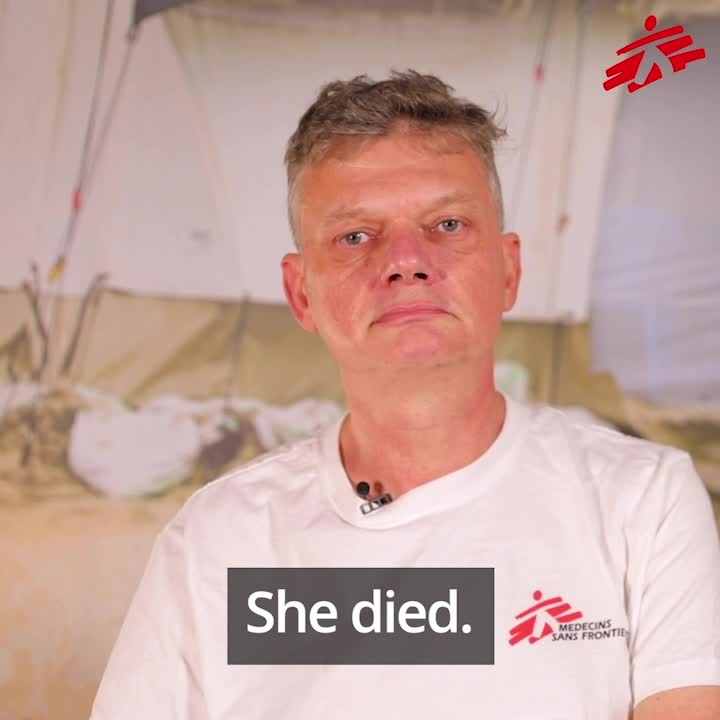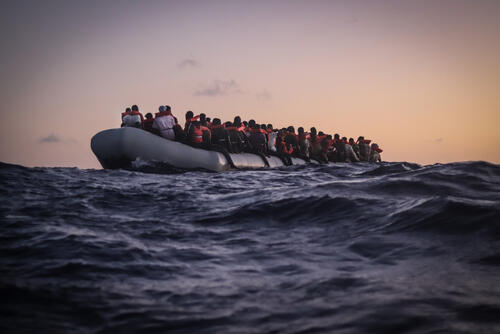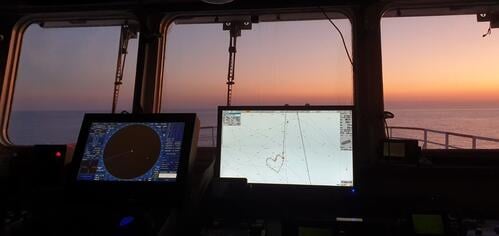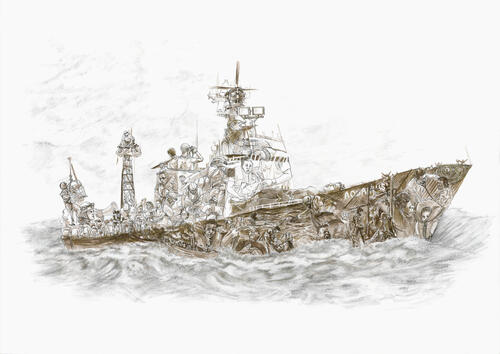The vast majority of people attempting the Mediterranean crossing pass through Libya, where they are exposed to horrific levels of violence, including kidnapping, torture and extortion.
People in Libya are also often detained in detention centres, usually in horrendous conditions - and those in detention in Tripoli have been trapped in the ongoing conflict in the city, with some centres having been caught in airstrikes, with people unable to escape, and then killed or injured.
European attempts to stem migration by strengthening national borders and bolstering detention facilities outside its borders are pushing people into smugglers hands to get them past checkpoints, across borders, through fences, out of prisons and ultimately onto boats on the Mediterranean Sea.
For those people who do make it to Europe, the challenges - and dangers faced - start again once onshore. A lack of shelter, being forced to live in unhygienic conditions or in adverse weather, treacherous border crossings, hostile authorities - in these circumstances, people become sick, injured, or struggle with mental health issues.
Instead of confronting the vicious cycle that their own policies are creating, politicians have hidden behind unfounded accusations towards NGOs and individuals who attempt to help people in dire straits.
MSF and search and rescue
Since May 2015, we have provided search and rescue capacity, or provided medical care during search and rescue operations, in the central Mediterranean Sea.
We currently run search and rescue operations on the M/V Geo Barents. The Geo Barents has been chartered from Norwegian shipping company Uksnøy, and sails under the flag of Norway.
There is currently very little dedicated search and rescue in the Central Mediterranean, but people are still trying to flee Libya. In 2023, 341,010 people attempted to cross the Mediterranean; just over a third (34 per cent) of those were intercepted at sea and returned to Libya, despite that Libya is not a place of safety. People continue to drown or go missing during the attempt; 3,041 died or went missing in 2023.

Why they had to flee isn't important - they're humans
We work in search and rescue because it is a duty, fuelled by the humanitarian need to prevent people from drowning while they seek safety from Libya.
Migrants, refugees, and asylum seekers in Libya face high levels of violence, extortion, and arbitrary detention with serious consequences to their physical and mental health. For these reasons, among others, returning people rescued at sea to Libya is a clear breach of international maritime, refugee, and humanitarian law.
Criminalisation of lifesaving search and rescue
During our Search and Rescue operations, MSF has been shot at by the European-funded Libyan coast guard and repeatedly accused of collusion with traffickers.
Since 2018, our search and rescue operations had encountered ever-larger obstacles, in an increasingly hostile environment, amid intense political pressure. In June 2018, Italian and Maltese authorities denied the Aquarius a safe port to disembark 629 people on board; from this point, Italian ports were effectively closed to NGO search and rescue vessels.
In both August and September the same year, the Aquarius was stripped of its flag and registration by the Gibraltar and Panama Maritime Authorities, respectively, after coming under political pressure.
Hostile attacks on Aquarius continued in November 2018, when the Italian judiciary requested the seizure of Aquarius due to spurious claims of waste mismanagement. Without a flag and registration, Aquarius was unable to continue its lifesaving mission and in December 2018, it was forced to terminate its search and rescue activities.
In 2019, the situation – both in Libya and politically in Europe – deteriorated. Tripoli plunged into conflict, where detention centres have been surrounded by fighting and hit by airstrikes. In the space of a year to July 2019, there were 21 rescue stand-offs, affecting over 2,600 vulnerable men, women and children.
Ad-hoc allocation of ports of safety, with often long delays before requests for a safe port are granted, continue today.
In 2020, amidst the COVID-19 pandemic, authorities in Italy would find flimsy excuses to detain search and rescue vessels, leaving almost no search and rescue capacity in the central Mediterranean and endangering lives. In September 2020, the Sea-Watch 4 was detained and impounded by Italian authorities for a period of six months, at a moment when six other search and rescue vessels were likewise detained.
On 26 July, 2021, after 24 days of detention in Augusta Port, Italy, the Geo Barents was formally released from administrative detention, returning to the Search and Rescue zone to continue saving lives at sea and to continue alerting on this humanitarian catastrophe in the central Mediterranean.
In 2023, chaos continues in Libya, with conflict and political and economic crises having worsened the situation. People are still desperately trying to flee.
Our ships
Since 2015, we have operated, or been partners on, eight ships:
- Phoenix, in partnership with Migrant Offshore Aid Station (MOAS);
- Dignity I;
- Bourbon Argos;
- Prudence;
- Aquarius, in partnership with SOS MEDITERRANEE;
- Ocean Viking, in partnership with SOS MEDITERRANEE;
- Sea-Watch 4, in partnership with Sea-Watch; and
- Geo Barents.
Medical care
Our medical teams on board treat violence-related injuries resulting from time in detention, torture and other ill-treatment, including sexual violence.
Women, especially pregnant women, receive dedicated care thanks to the presence of a midwife. Our midwives have assisted the delivery of several babies onboard our boats.
We also provide care to people with skin diseases, dehydration, hypothermia, scabies and serious injuries such as chemical burns caused by fuel mixing with sea water during the crossing. Psychological first aid is provided by trained cultural mediators.
During these consultations our teams often hear horrific stories; many of the people we rescue are victims of torture and other forms of ill-treatment.
What is MSF doing on land?
Once on land, people arriving in Europe discover the dangerous border crossings, are often beaten by authorities, and are forced to live in atrocious conditions, usually outdoors - including during winter.
In one migrant camp in Italy, a quarter of respondents to a survey said there was poor hygiene conditions in the camp. In a nearby settlement, more than one in ten said there was a lack of drinking water.
I’m sleeping under the bridge with other people. I have no money and no way of communicating with my family. I’m really tired. Nobody takes care of us, nobody asks me how I’m feeling or how I’m living.Migrant living in Roja River settlement, northern Italy
In Belgium, France, Greece, Italy, and Serbia our teams are providing a range of services to people recently arrived in Europe, including medical and psychological support.
We also provide shelter, water, sanitation and essential relief items at reception centres, informal settlements and transit camps.
Support centres
Our teams in France identify young people, who have usually undertaken the journey unaccompanied, and offer them support through a day centre for minors in Paris. Teams there provide respite, medical care and administrative assistance through the drop-in day centre.
MSF also ran specialised centres to respond to the needs of survivors of torture in Athens, Greece, most of whom came across the seas seeking safety and protection in Europe.






